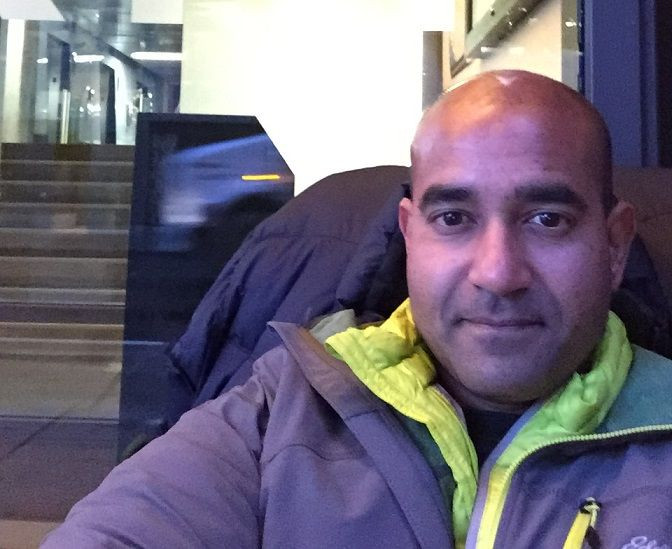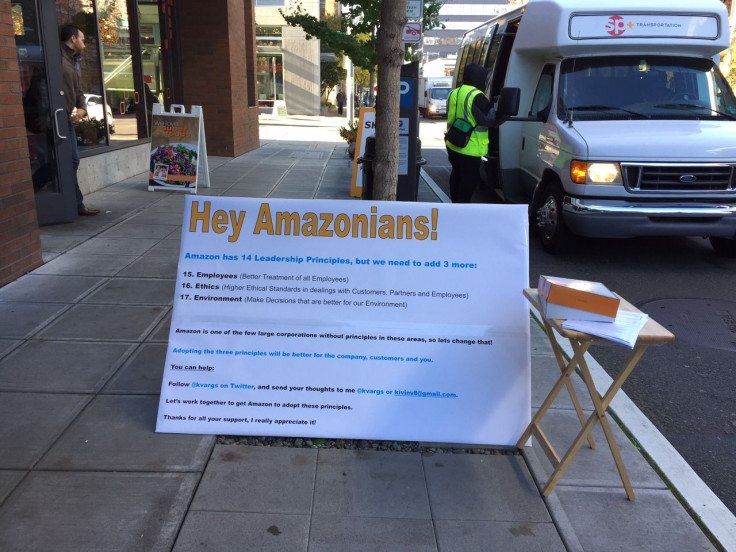Ex-Amazon Worker Plans Hunger Strike In Front Of Jeff Bezos’ Office To Protest Employee Treatment

Is this what it takes to get Jeff Bezos to eat crow? A former Amazon product manager who says he was fired for voicing concerns about a software glitch is planning to starve himself in front of the CEO’s office to raise awareness about the treatment of Amazon employees.
Kivin Varghese, who helped launch the Kindle Fire ad platform in 2012, said he knows the idea of a hunger strike sounds “weird and crazy,” but he said he’s exhausted every other option.
“It’s a drastic move,” Varghese conceded in a phone interview Wednesday. “But the only thing that’s going to get them to change is if customers realize what actually happens behind the clicks.”
For more than two weeks, Varghese has been staging a one-man protest outside the headquarters of Amazon.com Inc. in Seattle, handing out flyers and speaking with employees about what he says is a companywide culture that prioritizes free cash flow over employee welfare or even basic ethics.
At 7 a.m. next Tuesday, Varghese will stop eating. “I don’t know how long I’m going to last,” he said. “I’m going to last as long as I can. Until I either get arrested or forced to go to a hospital, I’m not going to quit.”

Varghese has been in a legal fight with Amazon for two years. He was let go from the company, he claims, after he learned that one of Amazon’s ad partners, Discover Card, was charged almost $500,000 for advertisements that customers never saw -- the result of a technical glitch in the Kindle Fire ad platform. Varghese said his supervisors opted to cover up the erroneous charge rather than alert Discover to what happened. He claims he was fired as retaliation for protesting the cover-up. He has since detailed his story in a 2012 lawsuit, and later in a letter to Amazon’s board, which was also sent to the Washington State Attorney General’s Office.
An Amazon spokesman declined to comment, citing a policy of not commenting on active litigation. In a motion for summary judgment filed last month, the company denied Varghese’s claim of wrongful termination and said he failed to meet performance expectations.
“Varghese was not a ‘whistleblower’ fighting unlawful contact,” company lawyers wrote. “He was an underperforming employee who had a difference of opinion with his employer as to the resolution of an issue with an arm’s-length contract between sophisticated entities.”
A spokesperson for Discover also declined to comment.
From Lone Protester To Martyr
After Varghese’s protest was picked up in the press, he said he began to receive emails and messages of support from current and former Amazon employees who claim that they, too, have been poorly treated. He added that some employees on the Amazon campus have also expressed their support but are afraid to speak publicly about it for fear of losing their jobs. He said his protest has been peaceful and he has not had any problems with security or law enforcement.
So why a hunger strike? Although Varghese’s demonstration began as a way to get Amazon’s attention regarding his specific situation, he said he feels a sense of duty to escalate the protest after hearing from so many Amazon employees at various levels within the company. One former employee said in an email to Varghese that working at Amazon “was the worst experience I’ve ever had in my professional life.”
Varghese said he has been most moved by emails he’s received from Amazon warehouse employees, whose demanding working conditions -- including long hours, low pay and allegedly unsafe work environments -- have attracted much criticism in the press and among labor advocates.
“I feel an obligation to do my best to get things changed,” Varghese said. “How did Amazon get to where it is? It’s on the backs of these employees that they just exploit and treat like robots.”
Varghese timed his hunger strike with the busiest shopping week of the year. Black Friday is on Nov. 28, followed by Cyber Monday on Dec. 1. Varghese is keeping a journal of the hunger strike on Tumblr. He said it’s his big opportunity to get consumers to think twice about what it means to buy from Amazon. “You might save a few dollars here or there,” he said, “But is it worth the human toll?”
Christopher Zara is a senior writer who covers media and culture. Got a news tip? Email me here. Follow me on Twitter @christopherzara.
© Copyright IBTimes 2024. All rights reserved.






















